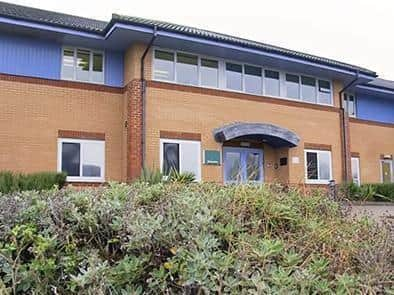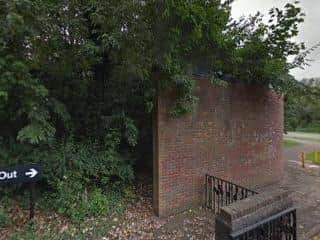Inquest finds 'serious failures' contributed to death of autistic teenager at Milton Keynes mental health unit
and live on Freeview channel 276
An inquest jury has found that serious failures of risk assessment, communication, and the setting of observation levels contributed to the death of 19-year-old Brooke Martin.
The jury returned their findings today (July 1), concluding a 10-day inquest into Brooke's death on 11 June 2019.
Advertisement
Advertisement
Brooke, who had diagnoses of Autism and Emotionally Unstable Personality Disorder, was detained under the Mental Health Act at Chadwick Lodge Hospital. Elysium Healthcare was in charge of the facility when Brooke died.


Brooke's family describe her as a caring, thoughtful and clever young woman. She had a chronic history of life-threatening self-harm.
The inquest jury concluded that Elysium Healthcare failed to properly protect Brooke. The jury outlined the following factors as contributing to her death: "The failure of staff to communicate information regarding an incident five days prior to her death."
The incident in question involved Brooke being found trying to do permanent harm to herself. The jury continued: "The failure of staff to search Brooke’s room after she was found handling potential [objects that could be used for self-harm] on the night she died. The failure of staff to increase Brooke’s level of observations to constant observations when she was found handling potential [harmful items] on the night she died."
Advertisement
Advertisement
Brooke, from Godalming in Surrey, was found unresponsive by staff on the evening of 10 June 2019. She was later pronounced dead at Milton Keynes Hospital.


The inquest heard that earlier that evening Brooke was twice found by staff to be handling an item which could be used to cause harm. The item in question had been concealed within Brooke's room.
After this incident, staff members failed to re-assess Brooke’s risk, to place her on constant observations, or to search her room for potential items that could be used to cause self-harm.
It was accepted after the incident which occurred just five days before Brooke's passing, by healthcare witnesses that this moment was a ‘massive red flag’ and an ‘alarm’.
Advertisement
Advertisement
However, it was not properly recorded or communicated between staff and as a result did not trigger a risk assessment or review of Brooke’s observations.
The inquest heard that the ward was ‘chaotic’ on 5 June 2019, when four serious incidents occurred simultaneously. At the multidisciplinary team meeting the following day it was not communicated that Brooke had attempted to end her own life.
Further, a ‘glitch’ affecting the computer system meant that the record of this incident was not available to staff within Brooke’s medical records. As a result staff treating Brooke on the day of her death were unaware that this earlier incident had taken place.
On the day of her death Brooke presented as overwhelmed and distressed. However this information was not handed over from the day to the night staff.
Advertisement
Advertisement
Elysium formally admitted during the inquest that when Brooke was twice found with items she could use on the night of her death these should have been removed from her. Also Elysium admitted that a a risk assessment should have been conducted and Brooke placed on constant observations.
Elysium accepted that had this action been taken Brooke would not have died. Elysium further accepted that, following the incident on 5 June 2019, Brooke’s risk should have been re-assessed and information about the incident communicated to staff treating her.
The inquest jury concluded that Brooke took her own life while suffering from a mental illness, namely Emotionally Unstable Personality Disorder.
The coroner confirmed that he would write a report, intended to prevent future deaths, to the Secretary of State for Health and Social Care concerning inadequacies.
Advertisement
Advertisement
Specifically addressing the systems in place for the sharing of medical records between healthcare providers. He confirmed that he would also raise the issue of the introduction of pressure sensors in mental health settings at the Milton Keynes Together multi-agency safeguarding group and with other coroners nationwide.
Brooke had begun to experience mental illness in her early teenage years. Her mental health deteriorated markedly during the 18 months prior to her death, resulting in numerous serious incidents of self-harm and periods of detention under the Mental Health Act.
The inquest heard that the severity of Brooke’s self-harming was such that between April 2018 and February 2019 she required medical treatment at one local A&E department on 39 separate occasions.
Between December 2018 and April 2019 Brooke was detained for treatment at Farnham Road Hospital in Guildford, which is run by Surrey and Borders Partnership NHS Foundation Trust.
Advertisement
Advertisement
In April 2019, Brooke was transferred to Chadwick Lodge Hospital. The inquest heard that although during her first month at Chadwick Lodge Brooke had found it difficult to settle, she was showing a ‘remarkable’ improvement by the time of her death.
A referral was being progressed for her to move to Hope House, a separate unit within the same hospital which delivers specialist therapy to treat Emotionally Unstable Personality Disorder.
During the days before her death Brooke, whose long-term ambition was to become a vet, told staff that she was eager to move to Hope House and engage in the therapy offered there.
Natasha Darbon, Brooke’s mother, said: “Brooke was a kind, clever woman and my best friend. I feel so incredibly sad that she is no longer here. As a family we did our best to keep Brooke safe in the community, but eventually the risk she would harm herself became too much for us to cope with.
Advertisement
Advertisement
"We thought it was a positive step when Brooke was admitted to hospital because she would finally receive the help she needed and in the meantime she would be kept safe by professionals with the necessary expertise.
"As a family we have been utterly shocked to learn of the inadequacies in the care provided to Brooke at Chadwick Lodge, and that opportunities to save her life were repeatedly missed by those entrusted with her care. I would like to thank the coroner and the jury for considering the evidence.
"I sincerely hope that lessons will be learned so that no other family has to lose a loved one in such tragic circumstances.”
Paul Martin, Brooke’s grandfather, said: "Brooke wasn't just a hospital reference number or a statistic, she was a much loved daughter and granddaughter. Not only has a generous spirit been lost but my opportunity to have great grandchildren. The unjust nature of her death is totally unacceptable.
Advertisement
Advertisement
"Despite her illness she was fighting to get better and move on to Hope House. The phrase ‘missed opportunity’ doesn’t do justice to the seriousness of the failures. I write this not just for myself but for all families that have to endure such injustice and the loss of loved ones in these circumstances. Lessons desperately need to be learned.”
Catherine Shannon of Bhatt Murphy solicitors and Stephen Clark of Garden Court Chambers, who represent the family, said: “Brooke was detained under Section 3 of the Mental Health Act when she died; she had a chronic history of life-threatening self-harm. This inquest has revealed stark failures in risk assessment, information sharing and observation setting in a mental health hospital dealing with an exceptionally vulnerable patient group.”
Selen Cavcav, senior caseworker at INQUEST, who works with the family, said: “Brooke was a young woman with the potential to get better. She had a supportive family who kept her safe, despite the challenges posed by her mental ill health. Yet within months of being admitted to this privately run facility she had died.
"At the time of her death Brooke was waiting for a transfer to Hope House, a facility offering specialist therapy for her needs. The lack of appropriate and safe units for young women with complex mental health needs, such as personality disorders, is a serious issue costing far too many lives.
Advertisement
Advertisement
"It is particularly frustrating to see the failings identified by this inquest echoed in so many others. Poor communication and a lack of active risk assessment causes deaths around the country. Yet the mechanism for responding to recommendations arising from inquests is ineffective. A mechanism for national oversight on deaths in places of detention is much needed and long overdue.”